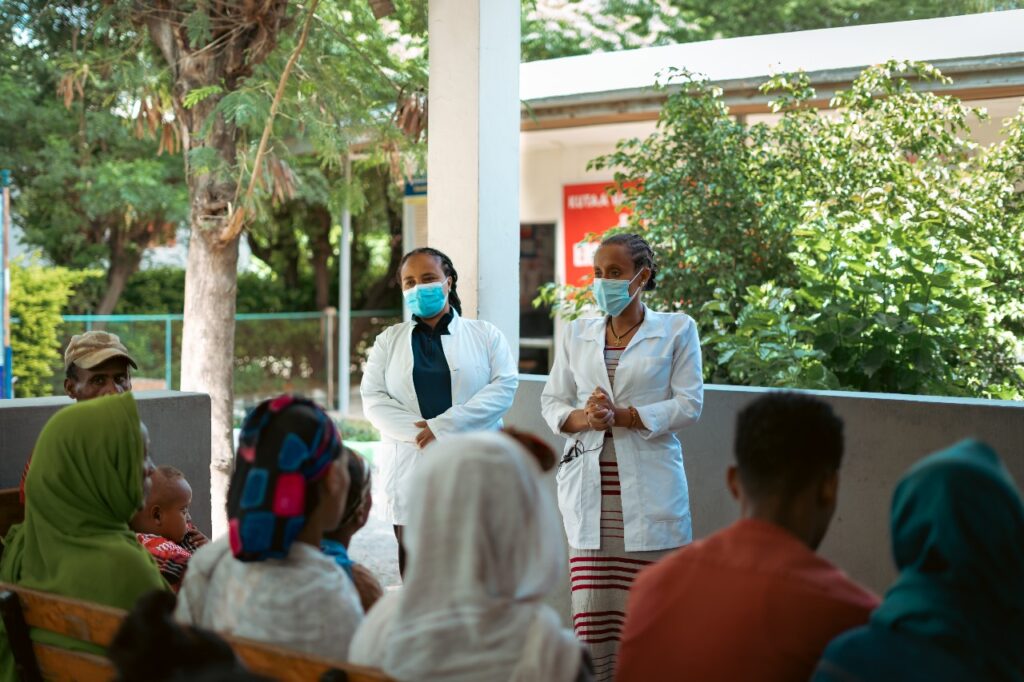With support from World Health Organization (WHO), health authorities have developed the National Self-Care Intervention Guideline, focusing on interventions for women, adolescent and child health
To address gaps in sexual and reproductive healthcare access, widened by the COVID-19 pandemic and ongoing humanitarian crises, Ethiopia is reinforcing its health system, making these vital services more accessible for women and adolescents in remote and crisis-affected areas.
A key part of this effort is promoting self-care, by giving people the knowledge and tools to manage their own sexual and reproductive health through safe, simple and affordable practices for family planning, HIV prevention, cervical cancer prevention, nutrition, and maternal, adolescent and youth health. Practical examples range from access to contraceptives, pregnancy tests, and HIV self-test kits, all supported by educational guidance. This also includes self-management of medical abortion in line with national legislation, which permits the procedure under certain conditions.
With support from World Health Organization (WHO), health authorities have developed the National Self-Care Intervention Guideline, focusing on interventions for women, adolescent and child health. They have also integrated self-care and expanded sexual and reproductive health services into key national policy guidelines, including those related to family planning, safe abortion care, teenage pregnancy reduction, and sexual and reproductive health responses in humanitarian settings.
Across the country, health workers are being trained to teach people how to promote these self-care tools. This started with a workshop for 38 public health officials from the Ministry of Health, Regional Health Bureaus and other institutions in June 2024. The initiative was then expanded to the sub-national level, equipping 67 health providers and managers with skills, in October 2024.
“The recommendations and action plan we developed will help us integrate self-care into our existing health services effectively,” said Daniel Nadew, Maternal Child Health desk team lead from Addis Ababa City Health Bureau.
Following the scaling up self-care training, at Kolfe Health Centre in Addis Ababa, one of the pilot facilities, the introduction of self-care services contributed to a significant increase in access to services. In 2024, as part of the family planning service delivery, more than 800 women received over-the-counter combined oral contraceptives, compared with 280 in 2022.
Additionally, 84 women were trained to self-administer a safe and effective injectable contraceptive, known as DMPA, and more than 1000 adolescents were provided condoms after training on correct use.
Moreover, 50 women received self-management of medical abortion services, which included comprehensive training on how and when to use the medication, the correct dose, side effects, possible complications, and guidance on when to get medical help.
“The self-care training has significantly improved my knowledge and skills in providing comprehensive family planning and abortion care. The practical sessions were particularly helpful, and I feel more confident in my ability to support women in my community,” said Fatima Belay*, a health worker from Addis Ababa.
Belay * also highlighted the benefits of self-administered injectable contraceptives: “I appreciate the ease and convenience of the self-administering contraceptive, which I am able to use at home, at my usual workplace, or wherever I am.”
Amid the humanitarian crises in the northern region of Amhara, WHO and the Ethiopian Public Health Institute trained 30 healthcare providers from 13 health facilities in conflict-affected districts on self-care intervention guidelines.
Following the training, nine facilities provided onsite selfcare orientation for their staff which resulted in over 100 women and adolescents being educated on selfcare for family planning, antenatal care, pregnancy danger signs, nutrition, and safe abortion.
Gish Abay Health Centre empowered 120 adolescents with skills for correct condom use and provided safe abortion care for 35 adolescent girls. Tilili Health Centre broadened the scope of self-care to include HIV self-testing, breast self-examination, pregnancy self-testing, and condom and emergency contraceptive use.
“These interventions significantly benefited the community and contributed to the efforts towards reducing preventable maternal and perinatal deaths. It will enable us to reach every mother, newborn, child, and adolescent in our community who are critically in need of health services,” said Nadew.
“Ethiopia’s commitment for self-care integration is empowering individuals, especially women and adolescents, with the knowledge and tools for proactive health management, offering considerable community convenience and cost savings,” said Dr Owen Kaluwa, WHO Representative in Ethiopia. “WHO is proud to support this effort, which significantly improves health outcomes by expanding access to critical sexual and reproductive health services, particularly crucial in conflict-affected areas.”







OTHER ARTICLES
Editorial — Prevent, inform, and act for women’s health in Africa
Kenya : Government Prioritises Maternal Health and Strengthens Support for Community Health Promoters
Strengthening pandemic prevention, preparedness, and response capacities in Senegal using the “One Health” approach